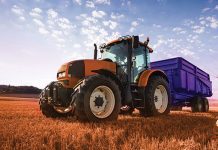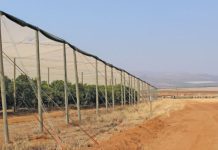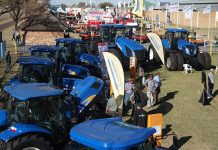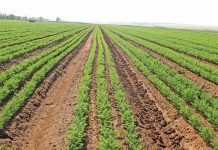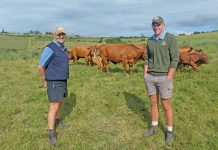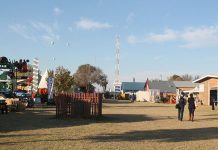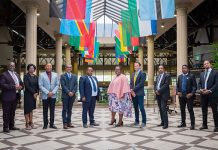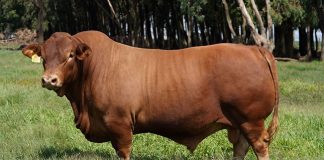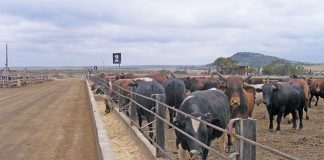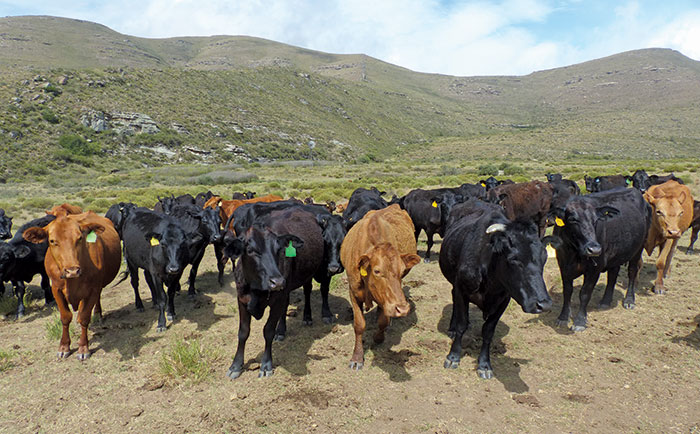
Photo: Mike Burgess
“Meat Wagon (ZK 15 41) was the first stud bull I sold to introduce myself to the market,” says Nkosemntu Nika (62) of the 1 980ha farm, Fairfield.
The farm is less than 10km away from the King family farm, Highland Home, where Nika’s father, Mtinteli, worked as a stockman for the late Jim and Noreen King. And it was at Highland Home where Nika spent his early childhood before leaving for schooling in Tarkastad and then Lady Frere.
“During holidays I’d be back with my father amongst the cattle,” he says. “I got interested in livestock that way.”
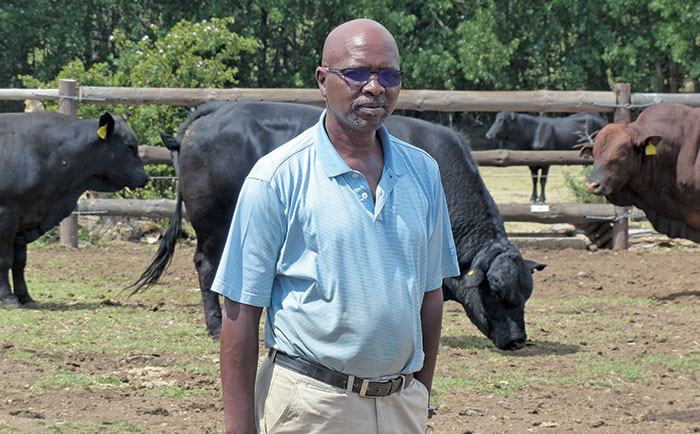
Today, his association with the Kings continues in the form of Jim and Noreen’s son and grandson, Barry and Llewellyn, owners of the Bottelgat Black Brangus Stud. They provide Brangus genetics and advice to Nika, who farms 220 black and red Brangus breeding cows, of which 80 are registered stud cows.
From the farm to the city, and back
Nika’s journey to stud breeder was by no means straightforward. He spent more than 35 years in the corporate world before returning to his own Winterberg livestock farm in 2012.
The foundation of his career in the city was laid by an excellent education at a farm school in the Winterberg, which eventually resulted in a chartered accounting qualification in 1987.
The school’s strong focus on mathematics changed the trajectory of Nika’s life. By the time he arrived at a Tarkastad township school in Grade 5 and then later at the Freemantle Boys’ High School near Lady Frere in the former Transkei, he was able to blossom, and it wasn’t surprising that he earned a matric with university exemption.
Disappointingly, there were no funds to attend university, so Nika’s father approached the Kings, who arranged funding for a BCom at the University of Fort Hare in the former Ciskei.
So continued the Kings’ interest in Nika’s education, and when he eventually received his chartered accounting qualification, it was with Noreen that he first shared the news.
Throughout the 1980s and up to the 2000s, Nika worked for a number of top private and public entities, including Anglo American, Royal Dutch Shell and PetroSA. He also worked in the UK between 1993 and 1997, but admits he was happy to return with his young family.
“I was missing home. I couldn’t take the weather,” he says honestly.
When he took early retirement from PetroSA after 12 years’ service, the bucolic experiences of his childhood began tugging at him, and he decided to access a farm in the Eastern Cape via the state land reform programme.
He was placed on a waiting list by the Department of Rural Development and Land Reform, and after a number of disappointments found that Fairfield in the Tarkastad district had recently been sold to the state.
Establishing the stud
Determined to obtain Fairfield, Nika decided to impress the department by buying 70% of the Drakensberger x Brangus cows on offer, as well as some sheep, at the Fairview dispersal sale.
“Department officials present told me it seemed I was very committed,” he says. “They then allocated the farm to me and I rented it with the option to purchase [as part of the programme].”
In 2012, Nika and his wife, Naledi, decided to move to Fairfield permanently while managing business interests elsewhere using a strong Internet connection and strategic commuting. (He is still the non-executive director of several companies, including Sibanye-Stillwater Gold).
Initially, significant investment was poured into the farm; in this regard, a R1,6 million recapitalisation state grant was greatly appreciated, says Nika.
From the beginning, the Kings suggested that Nika register a stud “to get closer to his cattle”, a decision he has never regretted.
“The best advice I ever got was to register my ZK Brangus Stud. I feel proud when I call workers on the radio to get cow ZK 14 67, because I know exactly which animal she is. I can identify each and every stud cow,” he says.
“If it was purely a commercial set-up, I wouldn’t have had to be as disciplined to collect data about them.”
Nika began by buying his first five bulls from Highlands Home, and his confidence in Bottelgat Brangus genetics has grown from there.
Although one of these original five bred exceptionally well, it was an R80 000 Bottelgat bull bought at the 2013 Brangus national sale in Harrismith that proved to be genetically transformative.
“Investing in quality bulls has really been worth it.
“The quality of my herd has improved vastly,” he says.
Cows and heifers have also been introduced to the herd from a number of breeders, including excellent genetics from Morné Verster of Le Roc Brangus Stud at Tweespruit in the Free State.
Management
The ZK Brangus Stud and commercial herds share Fairfield with 85 Dormer and 300 Merino ewes. The management of grazing is determined largely by the availability of water.
Although there are six dams (including one with a 2ha surface area), two boreholes and a number of fountains on the property, the high-lying north-eastern parts of the farm can be utilised only after good rain.
“In winter, I cannot graze the north-east because there’s no water,” says Nika. “But when it rains, I’ll push some animals that side.”
A critical component of Fairfield is 27ha of lucerne, of which 21ha is under gravity irrigation (16ha under Permaset and 5ha under dragline). Nika is also in the process of resurrecting 6ha of pastures around the home.
Normally, the cattle receive a maintenance lick in winter and a phosphate lick in summer. Cows about to calve get a protein energy supplement (Molatek Master 20), maize, salt and a lucerne ration. Breeding females also get a Multimin injection before being put to the bull, and again before calving.
All cattle are subjected to a standard inoculation and dosing programme. To combat tick loads, Nika gives the animals a Paratacide injection in February and a pour-on dip in July and again in November.
Breeding
Stud bulls are put to medium-framed stud and commercial cows in multiple sire herds during very dry seasons from the beginning of December to the end of February. Single-sire herds are preferred in wetter seasons (one bull to 25 to 30 cows).
Both purchased and self-bred bulls are used, and paternity is established via DNA testing.
In the past calving season, Nika achieved a calving rate of 79% across the stud and commercial herds, while the stud’s average intercalving period was 375 days. Calves are weaned at six months at an average weight of 185kg.
Bull calves, excluding a selected few, are castrated and marketed as weaner oxen via a video sale. All heifers are retained until two years, when replacement heifers are selected. Culls are then sold.
Employees
Getting the most out of livestock means getting the best out of staff, says Nika, who employs three permanent and two casual workers. He runs an incentive scheme to reward loyalty.
After two years of employment, a worker can choose a cow from which he will receive its calves until he decides to leave.
“When workers are looking at the cows, they should see not only my cows but also theirs.”
Email Nkosemntu Nika at [email protected].


